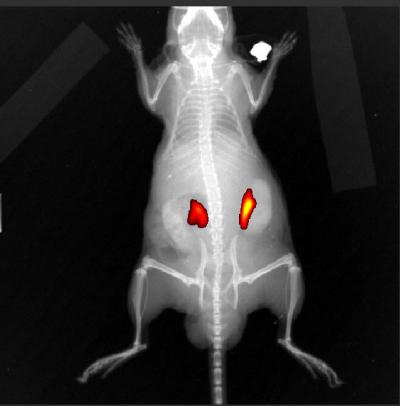A team of scientists has created a "conjugate" molecule -- one stitched together from two separate molecules -- that seeks out and blocks prostate cancer growth in lab animals.
The molecule NMI combines a near-infrared dye that targets cancer cells and a MAO-A inhibitor often used in antidepressants but recently shown to be effective at reducing or even eliminating prostate tumor growth in mice.

Near-infrared dye targets tumors in a mouse. Credit: Jean Shih / USC
"We are excited about this dye-MAO I conjugate that targets cancer cells specifically and more effective than any known MAO I itself. We hope it can be used for therapy, diagnosis and prognosis of prostate and other cancers," said Jean Shih, University Professor at the USC School of Pharmacy and corresponding author of the study in the Journal of the American Chemical Society. (http://pubs.acs.org/doi/abs/10.1021/ja512613j)
MAO-A, or monoamine oxidase A, is an enzyme that regulates the number of neurotransmitters in the central nervous system by deactivating some. Deficiency in MAO-A has been linked to aggression and anxiety, while too much MAO-A has been linked to depression.
Shih, who has studied MAO-A for 30 years, discovered last year that MAO-A provides cancer cells with an environment rich in reactive oxygen, allowing them to thrive. In tests on mice, MAO-A inhibitors that have long been known to treat depression were also found to be effective at blocking cancer cells' growth.
Since simply flooding the entire body of someone not suffering from depression with MAO-A inhibitors has the potential for harmful side effects, Shih teamed up with chemist Bogdan Olenyuk to find a way to deliver the molecule to the tumor -- and only the tumor.
The result was NMI, short for "near-infrared dye-MAO-A inhibitor conjugate," which combines a dye that oncologists use to light up cancer cells so they can track tumors with a MAO-A inhibitor.
"This conjugate has been developed through the fruitful collaboration of our groups under the auspices of the USC-Taiwan Center for Translational Research and is representative of a joint multidisciplinary effort. The initial result is very encouraging, and we will continue development of even more effective therapeutics based on this conjugate," said Olenyuk, professor of pharmacology and pharmaceutical sciences at the USC School of Pharmacy and co-corresponding author on the study.
In tests on mice, NMI proved to be even more effective at suppressing tumor cell growth than clorgyline, a powerful and irreversible MAO-A inhibitor with significant side effects.
Shih and Olenyuk said they plan to explore ways to commercialize their findings, but it will be several years before the compound is ready to be tested in humans. The MAO-A inhibitor by itself is currently in clinical trials through a collaboration with Mitch Gross at the Keck School of Medicine of USC.
The research was done in collaboration with Jason Boyang Wu, Tzu-Ping Lin, John Gallagher, Swati Kushal, Leland W.K. Chung and Haiyen Zhau.
Funding came from the Daniel Tsai Family Fund, U.S. Department of Defense Prostate Cancer Research Program; the Boyd and Elise Welin Professorship; NIH/National Cancer Center Institute; the Board of Governors Endowed Cancer Chair and the Margaret E. Early Medical Research Trust Award.





Comments